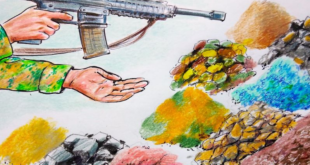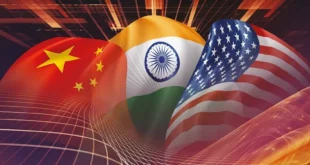Nearly half a millennium ago Niccolo Machiavelli’s The Prince described three options for how a conquering power might treat states that it defeated in war but that “have been accustomed to live under their own laws and in freedom: … the first is to ruin them, the next is to reside there in person, the third is to permit them to live under their own laws, drawing a tribute, and establishing within it an oligarchy which will keep it friendly to you.”[1]
Machiavelli preferred the first option, citing Rome’s destruction of Carthage. That is what the United States did to Iraq and Libya after 2001. But in today’s New Cold War the mode of destruction is largely economic, via trade and financial sanctions such as the United States has imposed on China, Russia, Iran, Venezuela and other designated adversaries. The idea is to deny them key inputs, above all in essential technology and information processing, raw materials, and access to bank and financial connections, such as U.S. threats to expel Russia from the SWIFT bank-clearing system.
The second option is to occupy rivals. This is done only partially by the troops in America’s 800 military bases abroad. But the usual, more efficient occupation is by U.S. corporate takeovers of their basic infrastructure, owning their most lucrative assets and remitting their revenue back to the imperial core.
President Trump said that he wanted to seize Iraq’s and Syria’s oil as reparations for the cost of destroying their society. His successor, Joe Biden, sought in 2021 to appoint Hillary Clinton’s loyalist Neera Tanden to head the government’s Office of Management and Budget (OMB). She had urged that America should make Libya turn over its vast oil reserves as reparations for the cost of destroying its society. “We have a giant deficit. They have a lot of oil. Most Americans would choose not to engage in the world because of that deficit. If we want to continue to engage in the world, gestures like having oil rich countries partially pay us back doesn’t seem crazy to me.”[2]
U.S. strategists have preferred Machiavelli’s third option: To leave the defeated adversary nominally independent but to rule via client oligarchies. President Jimmy Carter’s national-security advisor Zbigniew Brzezinski referred to them as “vassals,” in the classical medieval meaning of demanding loyalty to their American patrons, with a common interest in seeing the subject economy privatized, financialized, taxed and passed on to the United States for its patronage and support, based on a mutuality of interest against local democratic assertion of nationalistic self-reliance and keeping the economic surplus at home to promote domestic prosperity instead of being sent abroad.
That policy of privatization by a client oligarchy with its own source of wealth based on the U.S. orbit is what American neoliberal diplomacy accomplished in the former Soviet economies after 1991 to secure its Cold War victory over Soviet Communism. The way in which client oligarchies were created was a grabitization that utterly disrupted the economic interconnections integrating the economies. “To put it in a terminology that harkens back to the more brutal age of ancient empires,” Brzezinski explained, “the three grand imperatives of imperial geostrategy are to prevent collusion and maintain security dependence among the vassals, to keep tributaries pliant and protected and to keep the barbarians from coming together.”[3]
After reducing Germany and Japan to vassalage after defeating them in World War II, U.S. diplomacy quickly reduced the Britain and its imperial sterling area to vassalage by 1946, followed in due course by the rest of Western Europe and its former colonies. The next step was to isolate Russia and China, while keeping “the barbarians from coming together.” If they were to join up, warned Mr. Brzezinski, “the United States may have to determine how to cope with regional coalitions that seek to push America out of Eurasia, thereby threatening America’s status as a global power.”[4]
By 2016, Brzezinski saw Pax Americana unravelling from its failure to achieve these aims. He acknowledged that the United States “is no longer the globally imperial power.”[5] That is what has motivated its increasing antagonism toward China and Russia, along with Iran and Venezuela.
The problem was not Russia, whose Communist nomenklatura let their country be ruled by a Western-oriented kleptocracy, but China. The U.S.-China confrontation is not simply a national rivalry, but a conflict of economic and social systems. The reason why today’s world is being plunged into an economic and near-military Cold War 2.0 is to be found in the prospect of socialist control of what Western economies since classical antiquity have treated as privately owned rent-yielding assets: money and banking (along with the rules governing debt and foreclosure), land and natural resources, and infrastructure monopolies.
This contrast in whether money and credit, land and natural monopolies will be privatized and duly concentrated in the hands of a rentier oligarchy or used to promote general prosperity and growth has basically become one of finance capitalism and socialism. Yet in its broadest terms this conflict existed already 2500 years ago. in the contrast between Near Eastern kingship and the Greek and Roman oligarchies. These oligarchies, ostensibly democratic in superficial political form and sanctimonious ideology, fought against the concept of kingship. The source of that opposition was that royal power – or that of domestic “tyrants” – might sponsor what Greek and Roman democratic reformers were advocating: cancellation of debts to save populations from being reduced to debt bondage and dependency (and ultimately to serfdom), and redistribution of lands to prevent its ownership from becoming polarized and concentrated in the hands of creditors and-landlords.
From today’s U.S. vantage point, that polarization is the basic dynamic of today’s U.S.-sponsored neoliberalism. China and Russia are existential threats to the global expansion of financialized rentier wealth. Today’s Cold War 2.0 aims to deter China and potentially other counties from socializing their financial systems, land and natural resources, and keeping infrastructure utilities public to prevent their being monopolized in private hands to siphon off economic rents at the expense of productive investment in economic growth.
The United States hoped that China might be as gullible as the Soviet Union and adopt neoliberal policy permitting its wealth to be privatized and turned into rent-extracting privileges, to be sold off to Americans. “What the free world expected when it welcomed China into the free trade body [the World Trade Organization] in 2001,” explained Clyde V. Prestowitz Jr, trade advisor in the Reagan administration, was that, “from the time of Deng Xiaoping’s adoption of some market methods in 1979 and especially after the collapse of the Soviet Union in 1992 … increased trade with and investment in China would inevitably lead to the marketization of its economy, the demise of its state-owned enterprises.”[6]
But instead of adopting market-based neoliberalism, Mr. Prestowitz complained, China’s government supported industrial investment and kept money and debt control in its own hands. This government control was “at odds with the liberal, rules-based global system” along the neoliberal lines that had been imposed on the former Soviet economies after 1991. “More fundamentally,” Prestowitz summed up:
China’s economy is incompatible with the main premises of the global economic system embodied today in the World Trade Organization, the International Monetary Fund, the World Bank, and a long list of other free trade agreements. These pacts assume economies that are primarily market based with the role of the state circumscribed and micro-economic decisions largely left to private interests operating under a rule of law. This system never anticipated an economy like China’s in which state-owned enterprises account for one-third of production; the fusion of the civilian economy with the strategic-military economy is a government necessity; five year economic plans guide investment to targeted sectors; an eternally dominant political party names the CEOs of a third or more of major corporations and has established party cells in every significant company; the value of the currency is managed, corporate and personal data are minutely collected by the government to be used for economic and political control; and international trade is subject to being weaponized at any moment for strategic ends.
This is jaw-dropping hypocrisy – as if the U.S. civilian economy is not fused with its own military-industrial complex, and does not manage its currency or weaponize its international trade as a means of achieving strategic ends. It is a case of the pot calling the kettle black, a fantasy depicting American industry as being independent of government. In fact, Prestowitz urged that “Biden should invoke the Defense Production Act to direct increased U.S.-based production of critical goods such as medicines, semiconductors, and solar panels.”
While U.S. trade strategists juxtapose American “democracy” and the Free World to Chinese autocracy, the major conflict between the United States and China has been the role of government support for industry. American industry grew strong in the 19th century by government support, just as China is now providing. That was the doctrine of industrial capitalism, after all. But as the U.S. economy has become financialized, it has de-industrialized. China has shown itself to be aware of the risks in financialization, and has taken measures to attempt to contain it. That has helped it achieve what used to be the U.S. ideal of providing low-priced basic infrastructure services.
Here is the U.S. policy dilemma: Its government is supporting industrial rivalry with China, but also supports financialization and privatization of the domestic economy – the very policy that it has used to control “vassal” countries and extract their economic surplus by rent-seeking.
Why U.S. finance capitalism treats China’s socialist economy as an existential treat
Financialized industrial capital wants a strong state to serve itself, but not to serve labor, consumers, the environment or long-term social progress at the cost of eroding profits and rents.
U.S. attempts to globalize this neoliberal policy are driving China to resist Western financialization. Its success provides other countries with an object lesson of why to avoid financialization and rent-seeking that adds to the economy’s overhead and hence its cost of living and doing business.
China also is providing an object lesson in how to protect its economy and that of its allies from foreign sanctions and related destabilization. Its most basic response has been to prevent an independent domestic or foreign-backed oligarchy from emerging. That has been one first and foremost by maintaining government control of finance and credit, property and land tenure policy in government hands with a long-term plan in mind.
Looking back over the course of history, this retention is how Bronze Age Near Eastern rulers prevented an oligarchy from emerging to threaten Near Eastern palatial economies. It is a tradition that persisted down through Byzantine times, taxing large aggregations of wealth to prevent a rivalry with the palace and its protection of a broad prosperity and distribution of self-support land.
China also is protecting its economy from U.S.-backed trade and financial sanctions and economic disruption by aiming at self-sufficiency in essentials. That involves technological independence and ability to provide enough food and energy resources to support an economy that can function in isolation from the unipolar U.S. bloc. It also involves decoupling from the U.S. dollar and from banking systems linked to it, and hence from U.S. ability to impose financial sanctions. Associated with this aim is creation of a domestic computerized alternative to the SWIFT bank-clearing system.
The dollar still accounts for 80 percent of all global transactions, but less than half of today’s Sino-Russian trade, and the proportion is declining, especially as Russian firms avoid dollarized payments or accounts from being seized by U.S. sanctions.
These protective moves limit the U.S. threat to Machiavelli’s first option: destroy the world if it does not submit to U.S.-sponsored financialized rent extraction. But as Vladimir Putin has framed matters: “Who would want to live in a world without Russia?”
Kin Chi: My quick comment: The USA surely would want to destroy its rival, taking the first option. But it knows it is impossible to succeed, even in the case of Russia, and not to mention China. Thus it hopes for the rival to disintegrate from within, or for substantial interest blocs from within to be complicit with US interests. Hence we need to assess how Russia and China are reacting to this challenge, given that there are multiple contesting forces within each country. And that is also why we have been very concerned with pro-US neo-liberal political economists and policy-makers in these two countries.
I agree with you that China has put much investment into infrastructure and industry. However, we have been concerned with China’s financialization moves. Hence your statement that “China has avoided financialization” may not be the actual case, as various moves have been taken in financialization, but we can say that China seems to be aware of the risks in financialization, and has taken measures to attempt to contain it, causing discontent from US financial interests which would want to see China going further down the road.
It is interesting that yesterday, the White House expressed concern over the China-Iraq use of digital RMB to settle oil accounts as this would be beyond US monitoring of transactions.
 Eurasia Press & News
Eurasia Press & News



